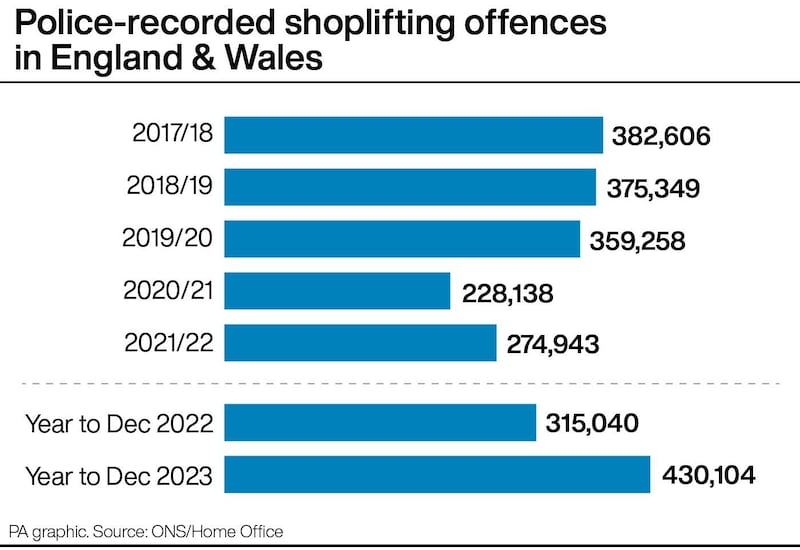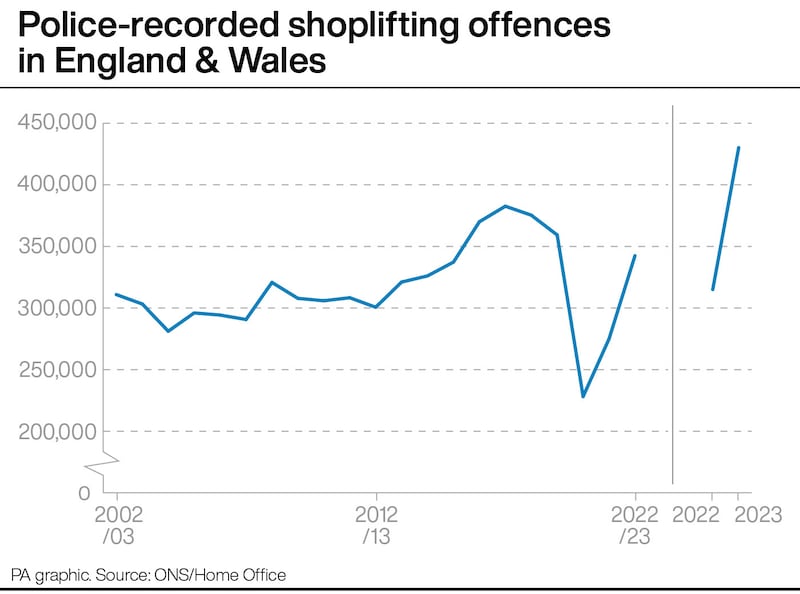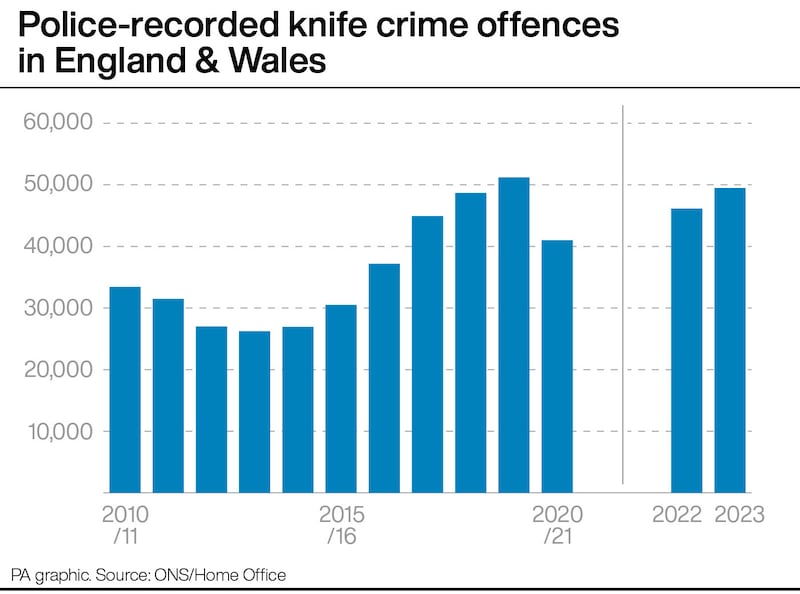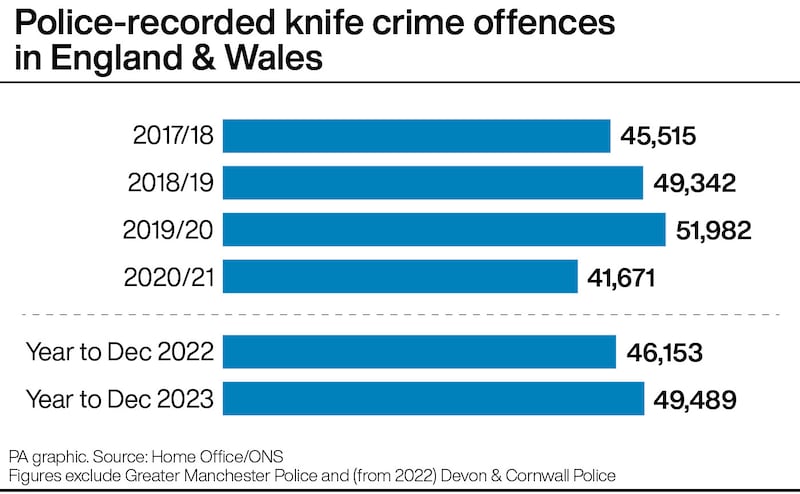The number of shoplifting offences recorded by police in England and Wales has risen to the highest level in 20 years.
A total of 430,104 offences were logged by forces last year, up more than a third (37%) on the 315,040 recorded in the previous 12 months to December 2022.
The figure is the highest since current records began in the year to March 2003, according to the Office for National Statistics (ONS), which described the latest increase as “notable”.
The data published on Thursday comes in the wake of major retailers raising concerns about the rising cost of theft.

The figures also show the number of offences involving theft from the person stood at 125,563 in 2023, up 18% from 106,606 in 2022 and is the highest level since 2004 (137,154).
The number of robberies recorded rose by 13% last year to 81,094, up from 71,983 in 2022 – although this is still 26% lower than the year ending March 2003 (110,271).
James Lowman, chief executive of the Association of Convenience Stores, said the figures were “sadly not surprising”, adding: “Thieves are stealing on a regular basis without fear of apprehension, so it’s essential that every police force in the country takes theft seriously, not least because challenging thieves is one of the biggest triggers for abuse of shopworkers”.
The figures are likely to only represent a “fraction of the true picture on shop theft”, he said, because the “vast majority of incidents that take place end up not being reported because of the time taken to report the crime and the lack of follow up from the police”.
Earlier this month the Co-op said thousands of shoplifters were walking free after being detained by undercover guards in its stores, as the retailer urged action to stop criminals viewing it as a crime without consequences.
Ahead of local elections next week, the retailer called on newly elected police and crime commissioners to “deliver the protection that those working in retail and serving communities in towns, villages and cities across the UK deserve.”
Dame Sharon White, chairwoman of the John Lewis Partnership which also owns Waitrose, last year declared shoplifting was an “epidemic” and said incidents were not always investigated by police.

Iceland executive chairman Richard Walker previously said his company is spending “more than ever” on security, yet “serious incidents have never been higher”.
Labour’s shadow home secretary Yvette Cooper said: “These shocking figures show the scale of Conservative failure on law and order with another steep increase in knife crime and robbery, and record high shoplifting where organised criminals are just getting away with it.”
While the Liberal Democrats claimed Britain had gone from “being a nation of shopkeepers to one plagued by shoplifters”.
The party’s home affairs spokesman Alistair Carmichael accused the Government of “allowing the shoplifting epidemic to get out of control”, adding that shopkeepers were being “abandoned while criminals are allowed to act with impunity.”
Of the 408,690 police-recorded shoplifting offences in England and Wales in 2023 that were assigned an outcome, 16% (65,521) were charged or summonsed while 58% (238,794) of the investigations were closed with no suspect identified, according to Home Office data. This compares with 15% and 55% respectively in 2022.
Ahead of a meeting with senior police leaders, Home Secretary James Cleverly told reporters shoplifting had a “corrosive effect” on people’s confidence and that police should attend every incident and pursue every line of inquiry to send a message that “you don’t just get away with it”.
The College of Policing said the rise in shoplifting is “worrying”, adding: “We know shoplifting is a major public concern, and that’s why we’re boosting our guidance, providing additional support and being clear on the standards expected.
“There is more to do, and we will continue to focus attention on this crime.”
The Prime Minister’s official spokesman, who suggested an increase in shoplifting was being driven by organised crime, said such offences were “clearly unacceptable”.
The Government was “fully focused on keeping our streets safe, cutting crimes and protecting the public”, he told reporters.
“We’re absolutely clear that we should take a zero-tolerance approach to this crime”, he added as he told how police officers were “patrolling badly-affected areas and attending more crime scenes.”

Crime and policing minister Chris Philp insisted the figures show “communities are safer and our plan to cut crime and protect the public is working”, but added: “We know there is always more to do” as he pointed to the Government’s “tough new action to clamp down on shoplifting.”
Meanwhile, crimes involving knives or sharp instruments stood at 49,489 in 2023, up 7% from 46,153 in 2022, but 3% lower than the pre-pandemic total of 51,206 offences in the year ending March 2020.
The number of offences involving possession of an article with a blade or point rose slightly in 2023 to 27,672, up 1% from 27,463 in 2022.
The rise “follows more substantial increases in recent years, which may have been influenced by targeted police action to tackle knife crime”, the ONS said.
Police-recorded offences of possession of an article with a blade or point were 19% higher in 2023 than in the pre-pandemic year of 2019/20, and nearly double (up 92%) the figure for 2016/17.

But the figures on knife crime do not include offences recorded by Greater Manchester Police and Devon & Cornwall Police, due to problems recording data.
The overall number of crimes recorded by police in England and Wales in 2023 stood at 6.7 million, broadly unchanged (down 0.2%) on the previous year and higher than the 6.1 million in the pre-pandemic year of 2019/20.
Separate Home Office figures show the proportion of investigations into crimes recorded by police last year which were closed with no suspect identified rose to 40.6%, up from 38.5% in 2022.
The proportion of suspects being taken to court stood at 6.2%. In rape cases this was 2.6%. These are both slight increases on the previous period (5.6% and 1.9% respectively) but still among the lowest levels recorded.









